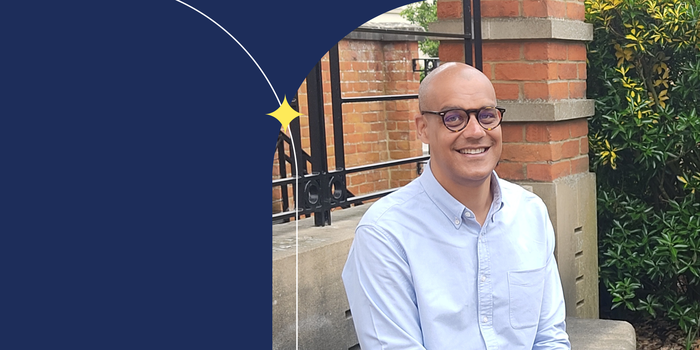
As a kid who liked playing computer games, Jerome Andrews knew from a young age he wanted to pursue a career in tech—but his trajectory was not a direct one. The U.K.-based Andrews dropped out of school for two terms to become a metal worker, cutting aluminum supports for glass roofing.
When he returned to his studies, he says, “I was fortunate to become an apprentice at IBM, where you worked three days and spent the other two at university studying computer science.”
From there, he worked for many years as both a project and product manager. He joined the fintech firm DTCC as a project manager in 2015 and has since worked his way up to become the Director of Technology, Research, and Innovation. His main goal: “To put innovation at the core of DTCC’s culture.”
Here, Andrews talks about the exciting work he’s doing with artificial intelligence (AI), the skills necessary to succeed in his role, and why ChatGPT isn’t as useful or smart as people think.
What attracted you to work at DTCC? How did you know the company would be a good fit?
They acquired the company where I was working! The company culture was similar as they already had an ownership stake, and our shared focus on post-trade technology made for a good fit.
What are you responsible for in your role? What are some of your short- and long-term goals?
I am a member of Technology Research & Innovation (TRI) group and I lead all internal needs related to data and AI. This involves leading the execution of innovative technology experiments, including primary research and process innovation.
The short-term goals are related to developing and executing on our AI strategy. The longer term goal is singular: making innovation a true peer to client focus and risk management.
What are you working on right now that excites or inspires you?
Firstly, we are working on determining where large language models (LLMs) like ChatGPT will and will not be used. While huge opportunities exist—especially in developer efficacy and overall productivity—we must first understand how to manage any new risk they could introduce. Related to this we are developing ethical AI recommendations to ensure our values are embedded in any AI project we undertake. Of course, our AI projects will also adhere to any legal and regulatory requirements. All of this is rapidly evolving, so that excites me. Plus, we are looking at where synthetic data can improve our software development lifecycle and accelerate our AI strategy.
What skills does it take to succeed in your role, as someone who is focused on experimentation and innovation?
Diversity of thought. There are many different routes to success so it’s vital we have a team that can see as many options as possible. You also need a flexible comfort zone because the work environment is fast-paced and results-oriented with short timelines and lean teams. Finally, the ability to find opportunities in ambiguity is a useful skill.
What makes DTCC an exciting place to work, especially for tech candidates?
DTCC is uniquely positioned at the center of global trading activity, processing more than 100 million financial transactions every day and pioneering industry-wide solutions. Technology is at the core of everything we do and you can be a vital part of making that difference.
LLMs like ChatGPT are a buzzy topic these days. What is one misconception about this and how would you respond to it?
One misconception is that all text generation/summarization/completion use cases are forever solved by LLMs and that human-generated material is no longer needed or inferior.
Consider authors Chaucer, Shakespeare, Jane Austen, JK Rowling, who were all writing roughly 200 years apart, all in English. If LLMs had stopped learning from a set date, then we could have a Chaucer-based LLM response to every question. Yes, many LLMs were trained on these authors; however, many didn’t know Charles III is King.
If future LLMs are trained based on output from other LLMs, we eventually end up with recursive learning. Original human generated input is vital to ensure LLMs continue to reflect society’s needs. To maintain innovation, both human and AI together will always play a role.
What is your favorite employee perk or benefit at DTCC?
The fruit and decent coffee in the London office!